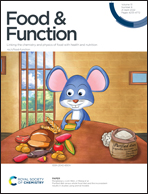Lactobacillus rhamnosus zz-1 exerts preventive effects on chronic unpredictable mild stress-induced depression in mice via regulating the intestinal microenvironment
Abstract
Depression remains one of the most prevalent psychiatric disorders, and it has been confirmed that it is related to the dysfunction of the microbiota–gut–brain axis. Manipulation of the gut microenvironment by probiotics might improve mental health and prevent stress-related psychiatric disorders. The present study aimed to determine whether Lactobacillus rhamnosus (L. rhamnosus) zz-1 could prevent the occurrence of depression and its potential mechanisms using a mouse model with chronic unpredictable mild stress (CUMS). The results indicated that L. rhamnosus zz-1 intervention ameliorated CUMS-induced depression-like behaviors of mice with reduced body growth rate, lowered sucrose preference, increased immobility time, as well as decreased curiosity and mobility. Moreover, L. rhamnosus zz-1 significantly inhibited hormones released due to hyperactivity of the hypothalamic–pituitary–adrenal (HPA) axis, alleviated CUMS-induced deficits of monoamine neurotransmitters, and increased the expression of brain-derived neurotrophic factor (BDNF) and tyrosine kinase receptor B (TrkB). These benefits were partially linked to the regulation of the intestinal microenvironment. L. rhamnosus zz-1 alleviated intestinal damage and reduced intestinal inflammation of the depressed mice. Meanwhile, L. rhamnosus zz-1 effectively adjusted the dysbiosis of mouse gut microbiota induced by CUMS, such as changes in the abundance of the Lachnospiraceae NK4A136 group, Bacteroides, and Muribaculum. Taken together, these results demonstrated that L. rhamnosus zz-1 was effective in preventing depression from chronic stress, adding new evidence to support the mental benefits of probiotics.

- This article is part of the themed collection: Food & Function HOT Articles 2022


 Please wait while we load your content...
Please wait while we load your content...